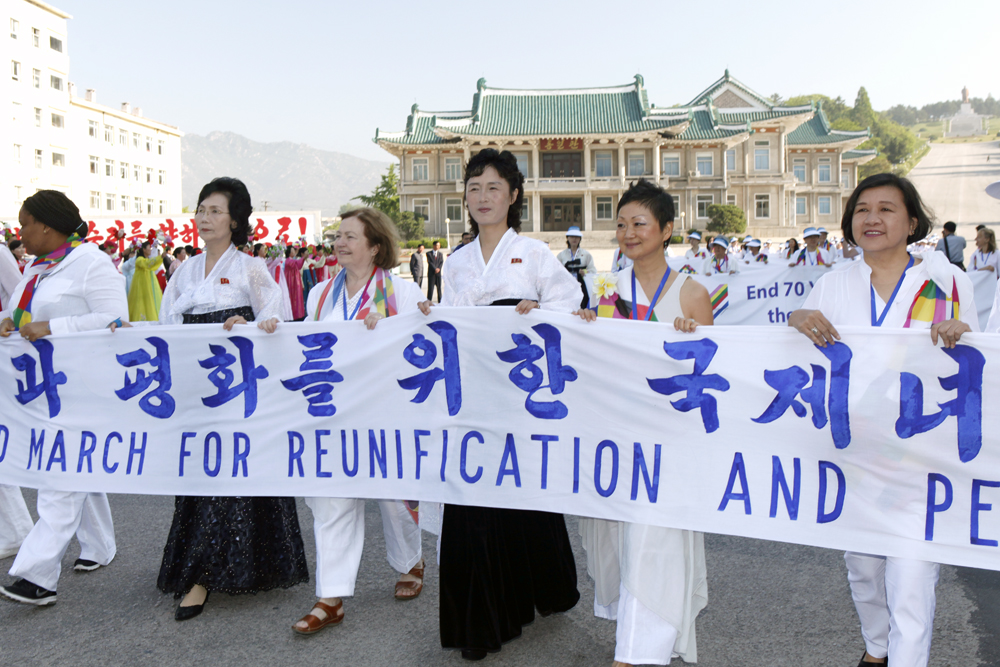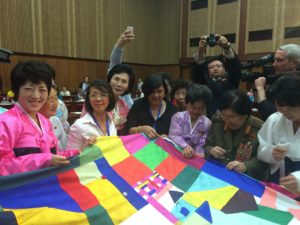The US State Department has denied special permits for travel to North Korea to two prominent American women mobilizing international support for the Korea peace process.
Christine Ahn, the founder and international coordinator of Women Cross DMZ, an international coalition of women peace activists, was denied a permit to travel to North Korea on April 3. Jody Williams, who won the Nobel Peace Prize in 1997 for her work to ban landmines and chairs the Nobel Women’s Initiative, was denied her permit on May 18.

In 2017, after a US student, Otto Warmbier, died after being released from a North Korean prison, the State Department imposed a “geographical travel restriction” on US travel to the country, effectively banning US citizens from visiting North Korea. The government, however, can grant a “special validation permit” to Americans seeking to visit the North if they meet certain conditions. Both Ahn and Williams had applied under that clause, but were turned down.
“The Department has determined that granting your request is not in the national interest of the United States,” Ahn and Williams were informed in identical letters obtained by Dispatch Korea. They were signed by Jonathan Rolbin, the director of State’s Office of Legal Affairs and Law Enforcement Liaison.
Ahn, who is based in Hawaii, arrived in Seoul on Monday. “It’s unfortunate they aren’t allowing us in this critical moment of facilitating understanding, building goodwill and trust between the people of North Korea and the United States,” she said in an email as she was preparing for her flight.
Ahn is leading an international women’s delegation to South Korea for a symposium and “DMZ Peace Walk” from May 23 to 26. She said the travel ban meant that she and other organizers had to shelve their planned program in North Korea. “Because I wasn’t allowed to travel to the North, our whole program was limited to South Korea, and I wasn’t able to go and discuss in detail the North Korea portion of the women’s peace talks and walk.”
The State Department would not respond to specific questions about its decisions. Instead, it provided an official who issued a generic explanation on background.
“We are not going to speak about individual applications for special validations of U.S. passports to travel to North Korea, but we continue to receive and adjudicate applications for special validations,” the official said. “A Geographic Travel Restriction was authorized to bar the use of a U.S. passport to travel in, through, or to North Korea due to mounting concerns over the serious risk of arrest and long-term detention in North Korea, absent a special validation.”
The official explained that such validations are granted “only for extremely limited purposes,” including “humanitarian or other purposes in U.S. national interests.” She added that State’s travel warning “remains in place – the Department of State strongly warns U.S. citizens not to travel to North Korea.”
Ahn said a total of 10 women were denied permits to visit North Korea, including Ann Wright, a former US Army Colonel and State Department official who was an original member of Women Cross DMZ.
The denials come at a critical time in the Korea peace process. Just three weeks ago, the leaders of North and South Korea met in Panmunjom and declared their joint intention to end the Korean War and work towards the “complete denuclearization” of the peninsula. But prospects for a planned summit on June 12 between President Trump and Kim Jong Un seemed to dim last week when Pyongyang cancelled an upcoming meeting with South Korea and threatened to call off the Singapore summit over concerns with US-South Korean military exercises and other issues.
On Tuesday, South Korean President Moon Jae-in will be in Washington to meet with Trump about how to move forward on the negotiating front. The two men also spoke on the phone over the weekend. On Sunday night, there was “no indication that the president is considering pulling out of the North Korea talks,” The New York Times reported.
Ahn applied for her permit in March so she could visit Pyongyang in April to meet with North Korean officials about arranging another visit to the North. In 2015, Women Cross DMZ led an unprecedented delegation of women activists, including feminist pioneer Gloria Steinem and two Nobel laureates from Ireland and Liberia, to North and South Korea.

During their visits to each country, they met with women’s groups and were given rare permission to cross the land border at the DMZ by bus (I was there when they crossed through a Customs and Immigration Center near the truce village of Panmunjom, and wrote about it for Politico).
In discussions with North Korean diplomats in New York this spring, Ahn was told that a DMZ crossing this May might be “tough” because of the upcoming summits. But she said South Korean activists, who have been doing a peace walk annually since 2015, wanted to proceed.
“We agreed with them,” she said, “so the compromise now is to get a delegation of North Korean women to Seoul” for the conference from May 23 to 26. “They are deliberating now, so there is still a 50 percent chance they will come.”
In Seoul, the women activists will stage a candlelight vigil at Seoul’s famous Gwanghwamun Square and meet with key South Korean government officials as well as diplomats from foreign embassies. Said Ahn: “We’re going to strategize how to press for women’s inclusion in the peace process – clearly an uphill battle between authoritarian and deeply patriarchal regimes!”
Women Cross DMZ posted a declaration about its delegation to Korea over the weekend. It reads in part:
Given the critical window facing the two Koreas, Women Cross DMZ and the Nobel Women’s Initiative believe it is urgent to demonstrate international solidarity with the peace and women’s movements in Korea. Our delegation will ensure that leaders from the two Koreas, United States, China and other countries that participated in the Korean War understand that citizens in these countries and around the world want this peace process to succeed.
In partnership with the Women’s Peace Walk, a coalition of more than 30 women’s peace organizations in South Korea, we are convening an international delegation of thirty seasoned feminist peace activists from across the world, representing peace movements based in Canada, China, Colombia, Guam, Hawaii, Iraq, Israel, Japan, Kenya, Mongolia, Navajo Nation, Northern Ireland, Philippines, Russia, Sweden, United Kingdom, and the United States.
As a global community, we have a responsibility to help finally bring an end to the Korean War. The Korean people need our solidarity at this critical hour, and women’s peace movements will be working together to see through a Peace Treaty that formally ends the Korean War and ensure women’s inclusion in the peace process to build a just and feminist postwar Korea.

